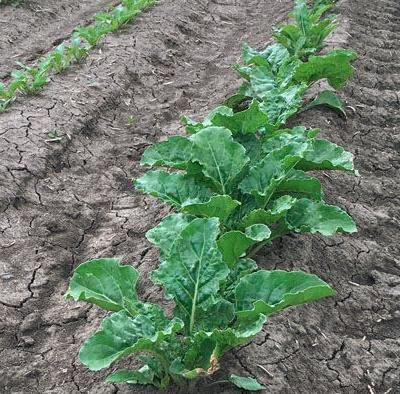New triple herbicide trait coming for sugarbeets

Sugarbeets growing on an eastern Montana farm. Beet farmers are looking forward to the Truvera, which will have three herbicides, to help keep a clean field.
Not only is biotechnology is an opportunity for the beet industry, but it is also an avenue to increase sustainability.
Scott Herndon, vice president and general counsel for the American Sugarbeet Growers Association (ASGA), told beet growers he was “incredibly excited about what biotechnology can bring for the future.”
Both biotech and gene editing, as well as genetically modified organisms (GMOs), have roles to play in growing sugarbeets across the country.
“Gene editing is new, but it would be really neat if we could have a gene-edited (beet) variety that would be resistant to root maggot, Cercospora leaf spot or rhizoctonia,” Herndon said.
Drought tolerance, higher sugar content, and higher tonnage could all be possible with gene editing.
The only gene-edited commodity in production in the U.S. right now is a high-oleic soybean oil, which offers a human benefit.
Gene editing not only also offers human benefits, but potential environmental advantages, as well.
Herndon pointed out that there is nothing standing in the way of creating a GMO sugarbeet with a gene-edited characteristic within the same seed variety.
“Hopefully, we will have this new tool for beets in the future,” he said. “You want high yields and as much sugar as possible with as little pest risk as possible,” he said.
One of ASGA’s goals is to create a regulatory structure that will speed approval of new seed varieties for beet producers to improve yields and efficiencies.
Last May, USDA passed a final regulation on GMO and gene editing of commodities that cut down on repetitiveness.
The rule specified that if the agency has already looked at a GMO trait for a commodity, it wouldn’t have to look at it again for the same commodity.
At ASGA, they drafted and gathered comments from producers and others before the gene editing regulation was set.
In October, the EPA published a proposed rule on gene-edited plant-incorporated protectants.
The ASGA again gathered comments along with other sugar allies.
“For example, say there was a sugarbeet that was resistant to a fruit maggot. Under this proposal, EPA would not regulate that, but they would want a ton of data on it,” Herndon said. “So we said okay, but we want it to be voluntary, because that could inhibit innovation.”
FDA has guidance and is expected to publish an update soon.
The world watches what the U.S. does and Herndon said, “We want to stand for innovation.”
KWS (KWS SAAT), a German seed breeding company, is working with Bayer to have a triple herbicide trait, which will be called Truvera.
The three herbicides are glyphosate, glufosinate and dicamba.
“We don’t know when it will be available for sugarbeets, but hopefully it’s by mid-decade,” he said. “The EPA will have to look at the new multiple herbicide-tolerant trait being developed for beets, because it was already passed for cotton, but not beets.”
The trait will be available to both Betaseed and Crystal Seeds beet seed companies.
Since, dicamba is part of the trait groups, Herndon said ASGA would start preparing to defend it. There are lawsuits Bayer is fighting now in order to keep dicamba for other crops, such as for soybeans.
“Once we get Truvera, we need to be very engaged,” he said
Source: Prairie Star
By Sue Roesler
